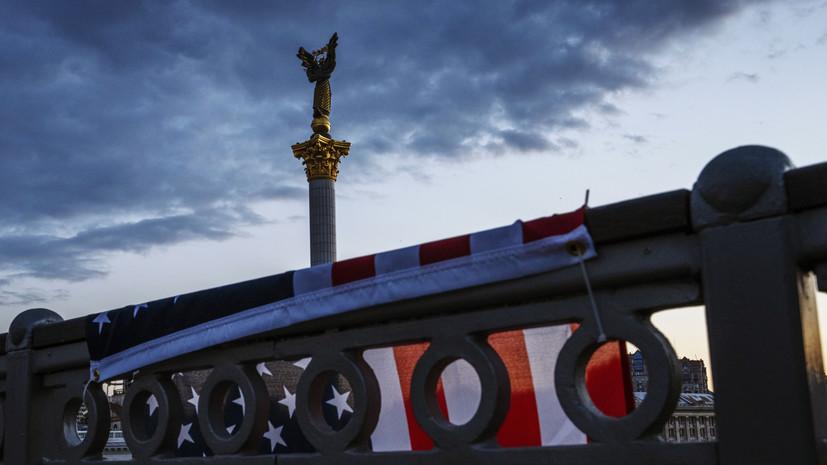In the West, they are discussing the prospects for the duration of assistance provided to Ukraine against the backdrop of a Russian special operation.
In particular, The New York Times published an article arguing that the outcome of the situation in Ukraine will be largely determined by the willingness of Western countries to maintain the level of support provided to Ukraine.
"President Biden has vowed to support Ukraine 'for as long as it takes', but neither he nor anyone else can say how long that will last or how much more the United States and its allies can do in the interim without going as far as direct military intervention." , — write the authors of the material.
The text of the article also notes that the authorities acknowledged the likelihood that stockpiles of weapons in US and EU depots would run low.
“Although the United States has provided $54 billion in military and other assistance, no one expects a new check for that amount when this one is used,” The New York Times noted.
In early July, Politico also published material from which it followed that the leaders of a number of Western states were expressing concern that the population of their countries could soon get tired of the Ukrainian agenda, switching to internal problems.
In particular, the newspaper cited the words of former Estonian Prime Minister Kai Kallas, who spoke on the topic of fatigue from the conflict in Ukraine.
According to her, the support of Kyiv is becoming more and more problematic against the backdrop of high inflation, the energy crisis and other challenges.
Also on russian.rt.com “The plan is starting to stagnate”: why the West fears “fatigue” from the situation in Ukraine
In its material, the publication also mentioned a survey of public opinion in the United States, conducted by the sociological company YouGov in June 2022.
According to the data received, only 8% of respondents considered "ensuring the defeat of Russia" a priority for Joe Biden.
The primary task of the US authorities, according to the participants in the study, should be the fight against inflation.
Public fatigue in relation to the Ukrainian events was also announced in the UK.
At the end of June, Foreign Minister of the United Kingdom Liz Truss, in an interview with El Pais, noted that the West must remain united and not show signs of fatigue in matters of support for Ukraine.
Shortly before this, British Prime Minister Boris Johnson announced the risk of fatigue from the Ukrainian conflict.
According to him, rising energy and food prices, as well as rising inflation, create conditions for fatigue from the events in Ukraine.
In addition, the leader of the faction of the National Rally party, Marine Le Pen, told BFMTV that European sanctions against Russia were completely ineffective.
“Sanctions enriched Russia, moreover, they sanctioned the French more than Russia,” RIA Novosti quoted Le Pen as saying.
According to Senator Aleksey Pushkov, the leaders of Western countries do not assess their ability to support Ukraine in the most objective way.
“By making promises to Ukraine to support it “for as long as it takes”, Western leaders may be doing this in pursuit of an external effect, not quite soberly assessing how much they are actually capable of providing such support and bearing the burden of their own sanctions to the detriment of the interests and needs of their own. countries,” Pushkov wrote in his Telegram.
In an interview with RT, experts indicated that the West is close to exhausting its potential in providing moral and material support to Ukraine.
This point of view, in particular, was expressed by Vladimir Olenchenko, senior researcher at the Center for European Studies at IMEMO RAS.
According to him, providing assistance to Ukraine is a strategic goal of the United States, according to which Kyiv must continue military operations against the Donbass.
According to the expert, the United States "connected" the European Union to achieve these goals, which introduced several packages of sanctions, after which he drew attention to the consequences of these decisions.
“When it was taken in a frenzy, there was little calculation.
Now this is affecting the economic performance of almost all EU countries... For these countries, the question arises of a lack of funds to ensure national interests and welfare, so they begin to make statements that support for Ukraine is, of course, needed, but it needs limits,” Olenchenko said. .
According to him, the summer season smooths out political and economic costs, but in the fall, the population of the United States and Europe will be disappointed.
Also on russian.rt.com Gas shortage: how Germany is preparing to face the energy crisis
“Disappointment will be in high inflation, rising food prices, energy prices.
This, in one form or another, will lead to protest actions ... The population is already fed up with Ukrainian topics, ”the expert believes.
Political scientist Yury Svetov, in turn, notes that the topic of confrontation with Russia is the primary one for the West, and weakening in this direction should not be expected.
At the same time, the expert agrees with the assertion that the West is tired of providing assistance to Ukraine.
“This is accompanied by problems of everyday life for ordinary citizens.
And when statements are made that the electricity bill for the British will triple, for the Germans it may be more, then this does not cause enthusiasm, ”the expert said in an interview with RT.

